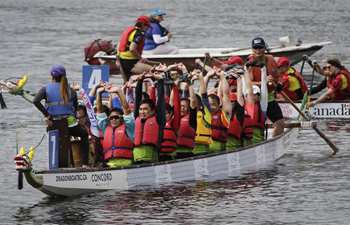by Raul Menchaca
CAIMANERA, Cuba, June 24 (Xinhua) -- Caimanera would be just another small Cuban town if it were not for the fact that it borders the Guantanamo naval base, an area on the eastern tip of the island that the United States has occupied since 1903.
Cuba has been demanding for more than five decades that the U.S. withdraw from the territory that sits on the sheltered Bay of Guantanamo, so far to no avail.
Just north of the naval base, tiny Caimanera, with just two main streets and 11,000 residents, would be a proverbial sleepy fishing village, except that its proximity to the military enclave has a tremendous impact on daily life.
The base is so close that some of its facilities are visible from town during the day, and the base's floodlights glow bright in the night. Sometimes, the noise of military drills and controlled mine detonations reverberates throughout the town.
"My students cannot completely concentrate in my classes due to the frequent explosions," Yendry Machin, who teaches at an elementary school, told Xinhua.
The number of explosions has lessened these days, Machin admits, but he grew up with warplanes buzzing overhead and sudden blasts, so he knows how unnerving they can be.
"The truth is that it scared me a lot, and it also affected my concentration at school," he said frankly.
In Caimanera everything is different from the rest of Cuba, because the government has a policy of compensating residents of the settlement.
Workers receive a 30-percent bonus on their regular monthly paychecks, and each inhabitant, no matter what age, gets additional rations of meat and milk subsidized by the government.
Leydis Ramirez, who was born and raised in Caimanera, distributes these rations at a small local shop.
"This is a border region. In Guantanamo, the capital of the province, they aren't as close to the U.S. base as we are here in Caimanera," she said.
As a border region, access to Caimanera is controlled for security reasons, mainly to prevent an incident that could heighten tensions between Cuba and the United States.
Visitors need to apply for a special entry permit that requires several days to be processed. The document records the dates of arrival and departure, and the name of the friend or relative to be visited.
The permits also serve to prevent people from illegally leaving the country by crossing over into the base, as happened in the early 1990s and still occasionally occurs today.
"There are people who come to this town with the sole intention of moving abroad, even though they can be returned due to the immigration agreements that have been signed between the two governments," Machin, the elementary teacher, said.













